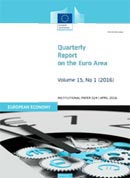|
|
|
|
|
|
|
|
|
|

|

|

|

|
Spain: Post-Programme Surveillance mission concludes that economy remains on track and financial sector more stable
A team from the European Commission, in liaison with staff from the European Central Bank, carried out the fifth post-programme surveillance visit to Spain on 11-13 April. The European Stability Mechanism participated in the meetings on aspects relating to its early warning system. The mission was limited in scope, and mainly focused on financial sector issues. The mission concluded that past structural reforms, bank recapitalisation and supportive financial conditions are reflected in the further stabilisation of the financial sector, a strong economic recovery and low sovereign risk premiums. In 2015, GDP expanded by a robust 3.2%, significantly above the euro area average, while the stabilisation of the financial sector continued. Nonetheless, significant challenges remain. Additional efforts to durably reduce the general government deficit as well as strong reform efforts remain paramount to further rebalance the economy. The next post-programme surveillance mission will take place in autumn 2016.
|

|

|

|
|

|

|
|
|
|

|

|

|

|
Investment Plan for Europe: EIF signs two more SME financing agreements in Italy and one in Greece
The European Investment Fund (EIF) has signed two new SME financing agreements in Italy: one with Banco Popolare, and one with Banca Popolare di Bari. Together these agreements will provide a further EUR 400 million in finance to innovative SMEs in Italy over the next two years. Vice-President Jyrki Katainen visited Athens on 18 April to mark the approval of the first project in Greece to benefit from the Investment Plan for Europe. The Greek industrial company will use the financing for research and development and establishing new product lines in manufacturing. As of 12 April 2016 the EIB Group – the European Investment Bank and the European Investment Fund – had approved EUR 11.2 billion of new financing to be backed by the European Fund for Strategic Investments (EFSI) guarantee from the EU budget combined with contributions from the European Investment Bank (EIB). The funds cover 220 approved transactions in 25 EU countries. The Commission will soon launch the full version of the European Investment Project Portal for public and private promoters to advertise their projects to potential investors, a kind of matchmaking service between projects and funds. Project promoters in all Member States can access the Advisory Hub for a wide range of advisory services in support of project identification, development and implementation, access to finance, the use of financial instruments, and capacity building.
|

|
|

|

|
|

|

|

|

|
G20 finance ministers and central bank governors commit to strengthening growth, agree next steps to combat tax evasion
The second G20 Finance Ministers and Central Bank Governors meeting under the Chinese Presidency took place in Washington on 14-15 April, in the context of the International Monetary Fund/World Bank Spring Meetings. The traditional topics of global economy and growth strategies, investment and infrastructure, financial regulation, international taxation and the reform of the international financial architecture were discussed at the meeting. Ministers recognised that the recovery remains modest and uneven, and that downside risks and uncertainties persist. They therefore reiterated their commitment to use all the policy tools at their disposal – monetary as well as fiscal – to strengthen growth and foster confidence. Moreover, they reaffirmed their commitment to advance the investment agenda, with a focus on infrastructure. G20 Members also agreed on the next steps in the fight against international tax evasion and avoidance. The 33rd meeting of the International Monetary and Financial Committee took place in Washington during the same period and focused mainly on the global economy, appropriate policy responses and IMF operations and governance. The next G20 FM & CBG Meeting will take place on 23-24 July in Chengdu. The IMFC will meet again on 7-8 October in Washington.
|

|
|

|

|
|

|

|

|

|
“The Transatlantic Economy: Convergence or Divergence?” – ECFIN organises conference with New York Fed and think tank
Under the heading “The Transatlantic Economy: Convergence or Divergence?”, a conference was jointly organised by ECFIN, the Federal Reserve Bank of New York and the Centre for Economic Policy Research in New York on 18 April. The conference brought together policy makers, regulators, market analysts and academics from both sides of the Atlantic to evaluate the prospects for sustainable economic growth and financial stability, as well as to discuss challenges to the transatlantic economic relationship posed by the economic crisis. During three sessions, the conference focused on fiscal convergence and monetary divergence, the appropriate policy response to secular stagnation risks and the possible creation of an integrated transatlantic financial market. Pierre Moscovici, Commissioner for Economic and Financial Affairs, Taxation and Customs, was the keynote speaker while ECFIN Director-General Marco Buti chaired a lively debate during the session on the appropriate policy response to secular stagnation risks.
|

|
|

|

|
|

|

|

|

|
European Economy Explained video explains why EU membership in G20 is a “win-win”
The latest video from the European Economy Explained series explains why EU membership in the G20 is a win-win situation. “The G20 and the EU”, which was released on 14 April, discusses how membership in the G20 group of leading advanced and emerging economies gives the EU the opportunity to ensure its priorities are taken up in the global economic policy debate and notes that the EU benefits from a consistent international framework for the rules of its single market. As it represents over 16% of world GDP and the euro is world’s second most important currency, the EU plays an important role in shaping the world’s response to pressing economic challenges. Every year the presidents of the European Council and the Commission join G20 leaders to reach common positions on global economic issues such as how to tackle macroeconomic imbalances, how best to coordinate economic reforms and how to devise growth-friendly fiscal policies. The video is based on a recent ECFIN publication, “The G20 and the EU: a Win-Win Game”.
|

|
|

|

|
|

|

|
 |

|
“Real Economy” episode examines hotly debated issue of deepening Economic and Monetary Union
The latest edition of The Real Economy turns the spotlight on the hotly debated issue of deepening Europe’s Economic and Monetary Union (EMU). The five presidents of the EU’s main institutions put together a report in 2015, to deepen and complete the EMU by 2025 at the latest, and implementation of their plan began in October. Stage 1 will be completed in June 2017, and aims to boost competitiveness and structural convergence by, for example, strengthening the coordination of fiscal policies at the national and euro area level. Stage 2 proposals are still under consideration and once agreed will be implemented by 2025. They may require treaty changes to advance in the areas of Economic, Fiscal, Financial and Political Union. According to Valdis Dombrovskis, Commission Vice President for the Euro & Social Dialogue, “stronger involvement of national parliaments actually means stronger sovereignty.” Christine Lagarde, Managing Director of the International Monetary Fund, said that “there is more work to be done on the banking union…in terms of coherent, cohesive supervision” and that “political union clearly warrants more efforts.”
|

|
|

|

|
|

|

|
 |

|
Registration for Brussels Economic Forum 2016 is open
The Brussels Economic Forum 2016 will take place on 9 June at Flagey. This annual flagship economic event of the European Commission attracts 1000 participants every year, including media representatives, and provides a major networking opportunity. It is the place to take stock of economic developments, identify key challenges and debate policy priorities. Now in its 16th edition, the event will focus on what steps are needed to achieve a deeper and fairer Economic and Monetary Union; which structural reforms are necessary to foster growth and sustain recovery; how the EU can be better prepared to cope with economic downturns; what the lessons learned are from economic adjustment programmes in Member States that were worst affected by the crisis; as well as how the Investment Plan for Europe contributes to boosting investment in the EU. The opening lecture will be given by ECB President Mario Draghi. Registration is now open.
|

|
|

|

|
|

|

|
 |

|
Annual inflation up to 0.0% in both euro area and EU
Euro area annual inflation was 0.0% in March 2016, up from -0.2% in February. In March 2015 the rate was -0.1%. EU annual inflation was also 0.0% in March 2016, up from -0.1% in February. A year earlier the rate was -0.1%. These figures come from Eurostat, the statistical office of the EU. In March 2016, negative annual rates were observed in 15 Member States. The lowest annual rates were registered in Romania (-2.4%), Cyprus (-2.2%) and Bulgaria (-1.9%). The highest annual rates were recorded in Belgium (1.6%), Sweden (1.2%) and Malta (1.0%). Compared with February 2016, annual inflation fell in 11 Member States, remained stable in seven and rose in nine. The largest upward impacts to euro area annual inflation came from restaurants & cafés (+0.12 percentage points), package holidays (+0.09 pp) and rents (+0.07 pp), while fuels for transport (-0.60 pp), heating oil (-0.23 pp) and gas (-0.10 pp) had the biggest downward impacts.
|

|
|

|

|
|

|

|
 |

|
ECFIN E-news slightly revises its presentation
As of May, this newsletter will reach you in a slightly revised presentation due to technical adaptations in the European Commission's Newsroom platform. However, the newsletter's current structure will remain the same. Later in the year we intend to ask you for your opinion on how to further develop and improve this publication.
|
|

|
|
|
|
|
|
|

|

|

|

|
Quarterly Report on the Euro Area (QREA), Vol.15, No.1 (2016)
Structural reform measures underway in Italy, France, Spain and Portugal could have significant economic benefits and raise GDP, according to model simulations presented in this edition of the QREA. Moreover, the positive short-term impact of product and labour market reforms on output and employment can be maximised through complementary measures that support demand, reduce the costs of some of these reforms, and through the appropriate sequencing of the specific reform measures. Other chapters in this edition look at the effects of population ageing and slowing total factor productivity growth on GDP, inflation and interest rates; and the role of firm entry and exit in driving total factor productivity growth in the EU.
|

|
|

|
|
|
|
|
|
|
|
|
|
|
|
|
|
|
|
|
|
|
|
|
|
|
|

|
|
Directorate-General for Economic and Financial Affairs
|

|
|